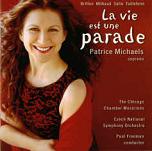This is a thoroughly entertaining, at times enlightening CD. The 11 songs by Satie have been orchestrated–two by Easley Blackwood, the others by Robert Caby–but the forces have been kept small so that the songs’ simple, catchy rhythms and/or witty observations and/or direct messages are never muddied. Many of them are music-hall inspired, such as “La Diva de l’Empire” and the more serious love song “Je te veux”, though others–five miniatures (including the lovely, dreamy “Les fleurs” and the puzzling “La statue de bronze”, about a frog)–are just plain art songs. “Sylvie” is a quiet meditation. Patrice Michaels has the bubbles in her attitude for the more “pop” songs and the fine legato for the others.
The four Ronsard songs by Milhaud were composed for Lily Pons, and indeed they exploit a soprano’s upper register. One vividly describes a fountain; a song to Cupid is more lolling and harmonically brave and requires a sustained high-D and plenty of high pianissimo singing. The third, sung to a noisy sparrow, is lightning fast and chock full of the roulades Pons was known for (although I bet Michaels, though with a less sweet sound, is constantly closer to the pitch than Pons ever was). The last is a quick-witted ode to spring and all its bounty–also with plenty of acrobatics, well-handled. Tailleferre’s songs, from a group called “Folklore de France”, are mostly syllabic and direct; their tunes are as captivating as the accompaniments are graceful. All are studies in a type of rehearsed spontaneity that perfectly exemplifies their time and origin.
The CD’s centerpiece, however (the Tailleferre and Satie songs are presented in chunks around it and the CD closes with the Milhaud), is Britten’s anything-but-lighthearted Les Illuminations. With texts by Rimbaud, the 10 poems, a veritable study in not-quite-sensible, dream-like imagery, are supported by strings alone, and Britten exploits them gloriously. They can be like trumpets in “Fanfare” or have the zest of a military band in “Royauté”, and the strings of the Czech National Symphony Orchestra are marvelous. Composed for female voice, this now is the only available recording that does not feature a tenor (one with Felicity Lott is out of print), and Michaels gets inside the surreal character of each song and has the wide dynamic range to do them all justice. She also has coloratura technique for the runs depicting the waves in “Marine”–and this is an absolute first to my ears.
Michaels is such a skillful singer and her artistry is so complete that neither occasional brittleness nor the fact that her bright instrument contains few colors ever becomes an issue. Her high, soft singing is as effective as her more extroverted exclamations. Her French diction varies; it is weakest in the Britten for some reason, probably because the music is more difficult. As mentioned, the Czech players are excellent in the Britten and just as good in the Milhaud and most of the Satie. The Chicago Chamber Musicians offer support just as strong in the Tailleferre and the Blackwood-arranged Satie. Paul Freeman’s leadership is rock-solid and he catches the meaningful silliness of some of the lighter fare as well as he does Britten’s darkness. This is a very satisfying CD. [10/7/2003]
































